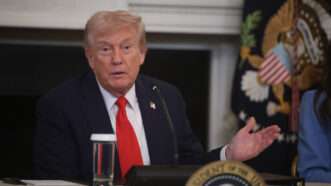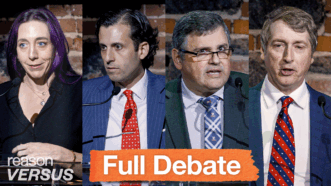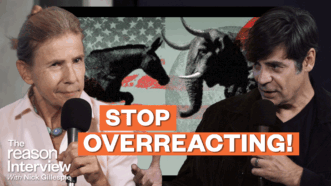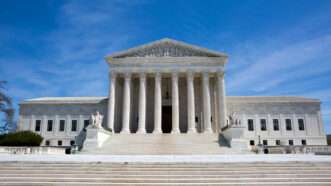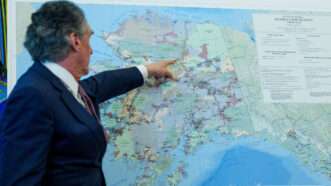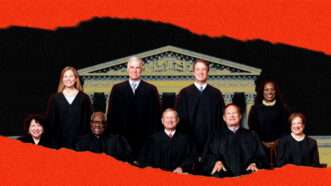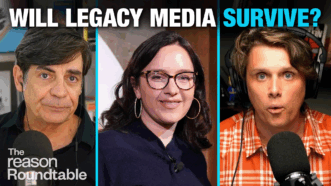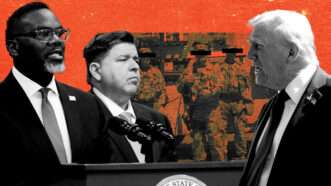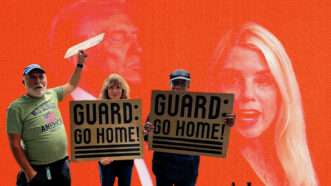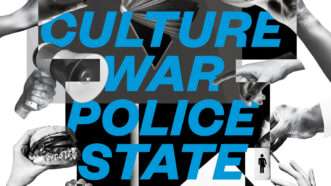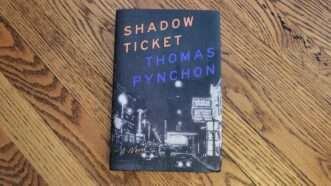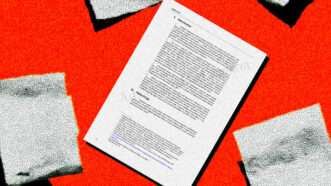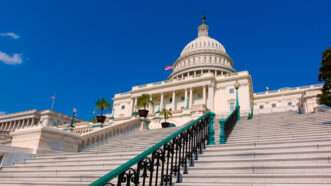Latest
The Constitution Does Not Allow the President To Unilaterally Blow Suspected Drug Smugglers to Smithereens
If the Trump administration wants to use military power, it should seek authorization from Congress, says Sen. Rand Paul.
States Are Banning Retail Sales of Dogs and Cats. It's Doing More Harm Than Good.
"By [activists'] own measurements, these bans aren't successful," says lobbyist Alyssa Miller-Hurley. "What they are successful at is fundraising."
Supreme Court Declines To Address Section 230 in Two Cases for This Term
Weakening or removing Section 230 would not fix the problems of social media, and in fact it could make things worse.
Reason Versus National Review: Is Mass Immigration Good for America?
Katherine Mangu-Ward and Alex Nowrasteh squared off against Rich Lowry and Steven Camarota to debate immigration.
Trump Calls for Arrest of Chicago Mayor and Illinois Gov. Pritzker
As Illinois resists the federal immigration blitz, the Trump administration ups the ante on authoritarian rhetoric.
Trump's Labor Department Admits That Trump's Immigration Crackdown Is Causing a Shortage of Farm Workers
With fewer immigrant workers available on American farms, there is a risk of "supply shock-induced food shortages," the Labor Department says.
Treasury Department Surveillance at the Southern Border Faces Fourth Amendment Challenges
A new FinCEN rule forced small money services businesses to collect personal data on nearly every customer transaction. Lawsuits claim this violates the Fourth Amendment.
Are Americans Addicted to Conflict?
Novelist Lionel Shriver explains why Americans overinterpret tragedies, compares today’s partisan divisions to the conflicts she witnessed in Northern Ireland, and argues that political manias are driving the country toward destructive extremes.
The Economy Doesn't Need Federal Jobs Data To Function
There are plenty of private alternatives to the employment report put out by the Bureau of Labor Statistics.
Conversion Therapy at the Court
Plus: Air traffic controllers get mysteriously sick, California gubernatorial contenders can't answer basic questions, and more...
TSA Watchlists Were Used as Tools of Political Warfare
The former Biden administration is accused of punishing critics without due process.
Oregon's E-Cigarette Censorship Is Unconstitutional—and Makes No Sense
Sometimes the state's rules require stores to cover almost the entire label of products—in places that don't even admit minors.
Democrats Are Proposing a 'Robot Tax' To Save Jobs From AI. Here's Why It Won't Work.
The policy would slow innovation, reduce competitiveness, and leave American workers unprepared for the future.
Republican Socialism: The Trump Administration Buys a Stake in Yet Another Company
The federal government can't even pass a budget. What's it doing buying a mine?
Alligator Alcatraz Was Built on Secrecy, Expansive Emergency Powers, and an Unprecedented State Power Grab
Shadowy deals and unilateral powers created Florida's notorious immigration detention camp.
Licensing Boards Are Legalized Cartels
Industry insiders dominate the boards that control who can work, using government power to shut out competitors, protect profits, and block reform.
Americans Are Turning Against Sports Betting—But It's Not Going Anywhere
Plus: World Cup ticket prices, Michael Jordan against NASCAR, and The Smashing Machine
Civil Rights Group Sues ICE for Withholding Records of the Agency's Detention Expansion Plans in Virginia
Lawyers at America's largest civil liberties group say the agency’s lack of transparency violates federal disclosure requirements.
Warrantless Searches, Tariffs, and the Unitary Executive: 3 SCOTUS Cases To Watch This Fall
In a new Supreme Court term packed with big cases, these disputes stand out.
Photo: Trump Sends His Drug Cops To See the Sights in D.C.
Rather than targeting cartels, DEA agents are patrolling tourist areas, setting up checkpoints, and even cleaning up litter.
Does Bari Weiss Prove Woke Media Is Collapsing?
Plus: the legality of Trump’s National Guard deployments, Democrat A.G. nominee’s leaked texts about shooting GOP rival, and what Argentina’s crisis means for libertarians.
Why a Trump Appointee Ruled That His National Guard Deployment in Portland Was Illegal
U.S. District Judge Karin Immergut concluded that the president's description of "War ravaged Portland" was "simply untethered to the facts."
Bari Weiss Has Won the War on Wokeness in Media
Paramount has acquired The Free Press for $150 million and named her editor in chief of CBS News.
Trump Sued—Again—for Unlawful and Unconstitutional Deployment of National Guard
This is the second lawsuit in a week challenging the Trump administration's National Guard deployments absent a qualifying emergency.
Trump's Troops Return to a City That Moved On: Dispatch From Portland
Five years after the city’s fiery 2020 protests, Portland is mostly calm. That hasn’t stopped Trump from reviving old battles, fueled by false memories and made-for-TV outrage.
British Minister: 'Just Because You Have a Freedom Doesn't Mean You Have To Use It'
Home Secretary Shabana Mahmood is moving to ban protests that annoy the public.
Whoops—Ohio Accidentally Excludes Most Major Porn Platforms From Anti-Porn Law
Ohio lawmakers set out to block minors from viewing online porn. They messed up.
Sending in the Guard
Plus: Kilmar Abrego Garcia's case, what's wrong with emergency rooms, and more...
Texas and Florida Have Become National Models for Using the Police State To Wage Culture War Battles
From library books to abortion, gender, and even food, the culture war is now feeding the police state.
Tennessee Alcohol Wholesalers Are Grabbing Control of the State's Hemp Market
A new law hands hemp distribution to the same powerful middlemen who dominate liquor sales and block out-of-state suppliers.
Lindy-Hopping Nazis and Golems With Guns: The Return of Thomas Pynchon
In Shadow Ticket, characters are forever finding refuge in the folds of the map.
Donald Trump Is the Coal President
Just as Biden’s preference for renewables distorted markets and harmed consumers, so too does Trump’s bias toward coal.
The U.S. Government Doesn't Want You To Read This Report on Israel's Business Deals
Whether or not one accepts the report's characterization of Israel's actions, the report itself is an interesting read on the economics of war.
Afghan Man Freed After Viral Arrest and Over 100 Days in ICE Custody
“I still believe in America. I do not feel betrayed. I feel hopeful because of how many Americans stood up for me when I was arrested.”
SCOTUS Will Consider a Challenge to Hawaii's Default Rule Against Guns on Private Property Open to the Public
The law is one of several attempts to override the right to bear arms by making it impractical to exercise.
Defending the Summary Execution of Suspected Drug Smugglers, Trump Declares an 'Armed Conflict'
The president thinks he can transform murder into self-defense by executive fiat.
Apple Removed ICEBlock From App Store Under DOJ Pressure
“This is protected speech,” said the app’s creator. “We are determined to fight this with everything we have."
Missouri Judge Backs City's Eminent Domain Redevelopment Plan
By calling the Manchester Road Corridor “blighted,” the city can now use eminent domain to clear the way for a $436 million project.
Trump's Planned Farm Bailout Should Require Congressional Approval
The Trump administration has already claimed the power to raise taxes without congressional approval. Now it is going to spend money that way too.
The Smashing Machine Looks at the Early Days of a Combat Sport Politicians Wanted To Ban
A fascinating but uneven actor's showcase for Dwayne Johnson.
No Calamity
Plus: Mamdani wants to cut gifted programs, Tyler Cowen's AI film takes, Newsom's revenge, and more...


